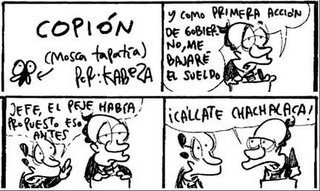 La Jornada On Line
La Jornada On Line
08/12/2006 12:13
México, DF. El diario estadunidense The New York Times reportó este viernes que el presidente Felipe Calderón que en sus primeros siete días en el poder “se ha movido rápidamente a adoptar algunas” de las propuestas hechas por su oponente de izquierda, Andrés Manuel López Obrador.
En su primera acción, Calderón redujo su salario diez por ciento, así como los de sus colaboradores de mayor nivel, y ofreció ese dinero para programas sociales, lo que significó la adopción de una de las “promesas favoritas de campaña” de López Obrador.
Después, explicó el diario en una nota informativa publicada en la sección "World", Calderón anunció una disminución de los gastos y, finalmente, dio a conocer un programa para financiar proyectos en los cien municipios más pobres de México.
De acuerdo con el rotativo, asesores de Calderón afirman que el mandatario no trata de calmar a la izquierda, sino de reconocer las necesidades del país, donde la mitad de la población vive con menos de cuatro dólares al día.
Otros analistas políticos, agregó el NYT, consideran que con sus decisiones, Calderón busca "construir puentes" entre los partidos al adoptar políticas de su "némesis", López Obrador, que "toman en cuenta la fuerte votación a su favor".-------
Nota Original - The New York Times 08/12/06
MEXICO CITY, Dec. 7 — Felipe Calderón’s presidency got off to a bumpy start last Friday when leftists heckled him during his oath of office, but during his first several days in the president’s chair he has moved quickly to adopt some of their pet issues.
Right off the bat, he slashed his salary and those of other top officials by 10 percent and said the money would go toward social programs, adopting in one fell swoop one of his leftist rival’s favorite campaign promises.
Then Mr. Calderón introduced a budget that slashed spending in his office and the Interior Ministry while raising spending steeply for public security and health care.
Finally, on Thursday, the president used his first out of town trip to highlight the poverty in Guerrero State and announced a program to pump money into 100 of the poorest towns in Mexico. He said closing the gap between rich and poor would be one of his top priorities.
“I know the enormous debt that Mexico owes to marginalized people and that this debt should be paid with acts of the government,” he said.
His current stances are a far cry from the pro-business and free-trade postures of his campaign and seemed to reflect a willingness to acknowledge that almost as many people voted for his rival, Andrés Manuel López Obrador, the former Mexico City mayor who championed the cause of the poor, as for him.
“He’s acknowledging that he has to address the issues that were legitimate in López Obrador’s discourses,” said Enrique Krauze, a historian and political analyst. “The issues were legitimate and he is saying he will tackle them.”
Mr. Calderón has also made plain that he intends to take a firmer hand when it comes to law enforcement than did his predecessor, Vicente Fox, who had a reputation for being timid and hesitant in using force to end violent social protests.
One of the new president’s first acts was to sanction the arrest this week of Flavio Sosa, the ringleader of leftist protesters who had held the southern city of Oaxaca in a state of anarchic siege for months.
For many Mexicans, the arrest of Mr. Sosa signaled the arrival of a law-and-order president after six years of Mr. Fox’s tolerance of social unrest. Some critics, however, pointed out that Mr. Calderón has yet to take action against Oaxaca’s governor, Ulises Ruiz, or any of the gunmen believed to be linked to his government who are responsible for killing at least 12 protesters and a journalist.
Still, even his critics said Mr. Calderón appeared to be trying hard to start his administration out as an active president willing to make tough decisions and break the inertia that characterized Mr. Fox’s term. The former president was often criticized as well for not providing forceful leadership.
“He has tried to send the message that the era of the invisible government is over, that he’s a hands-on man,” said Denise Dresser, a political scientist and writer.
Mr. Calderón has also sent signals he is willing to take on some of the business interests who backed his candidacy. During his first major address to the nation, he said that he wanted to “remove obstacles that keep businesses and the economy together from growing” and that the country’s businesses needed competitive prices that could only come from “fair competition without privileges.”
His remarks were seen by many here as an clear allusion to Mexico’s monopolies and cartels in critical industries that drive up the cost of everything from telephone service to cement.
Mr. Calderón’s aides maintained the new president was not trying to appease the left, but only recognizing the needs of the country, where half the people live on less than $4 a day.
But other political analysts said that Mr. Calderón was clearly trying to build bridges across party lines by adopting the issues of his nemesis, Mr. López Obrador, and taking into account the strong vote for him.
“That’s fine with me,” said Rossana Fuentes Berain, an editor of the Spanish edition of Foreign Affairs and the editorial page editor for El Universal newspaper. “He’s listening. He’s not deaf and he’s reacting to what needs to be done in this country.”

No hay comentarios.:
Publicar un comentario